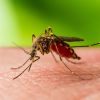-
 +18 +1
+18 +1The U.S.’s first open-air genetically modified mosquitoes have taken flight
After a decade of argument, Oxitec pits genetically modified mosquitoes against Florida’s spreaders of dengue and Zika.
-
 +20 +1
+20 +1Gene manipulation using algae could grow more crops with less water
Tobacco plants have been modified with a protein found in algae to improve their photosynthesis and increase growth, while using less water, in a new advance that could point the way to higher-yielding crops in a drought-afflicted future.
-
 +19 +1
+19 +1Oxitec wins approval to release GMO mosquitoes in US
Oxitec has received state and federal approval to release genetically modified (GM) mosquitoes in a pilot project planned for the Florida Keys now through 2022. The research is intended to show that GM mosquitoes are a viable alternative to spraying insecticides in a bid to control the invasive Aedes aegypti mosquito that spreads Zika, dengue, yellow fever and other diseases.
-
 +11 +1
+11 +1Scientists Find Genetic Reason Why Store-Bought Tomatoes Taste So Bland
Store-bought tomatoes taste horrifically disgusting — err, bland. Now scientists have discovered a version of a gene that helps give tomatoes their flavor is actually missing in about 93 percent of modern, domesticated varieties. The discovery may help bring flavor back to tomatoes you can pick up in the produce section.
-
 +3 +1
+3 +1Demystifying GMOs: New Research Shows Unexpected Changes in Plant DNA
Genetically modified organisms (GMOs) are one of the most contentious topics in science today. But a study from the Salk Institute, published last month in PLOS Genetics, may help clear up some of the confusion. Using a combination of techniques known as nanopore sequencing and optical mapping, researchers believe they have a clearer picture of what happens when genes are spliced into the genomes of plants and animals.
-
 +16 +1
+16 +1Sydney scientists solve 30 year wheat rust puzzle
Researchers from the University of Sydney, CSIRO, the United Kingdom’s John Innes Centre, Limagrain UK and the National Institute of Agricultural Botany (NIAB) have isolated the first major resistance genes against the stripe rust disease that is devastating wheat crops worldwide. The discovery by the scientists, who have cloned three related rust resistance genes – called Yr7, Yr5, and YrSP – will enable these important genes to be accurately monitored and integrated into breeding programs in the fight against ever-changing pathogens that could kill about 70 percent or more of whole wheat crops at a time.
-
 +25 +1
+25 +1With deal to close this week, Bayer to retire Monsanto name
Germany's Bayer will wrap up the $63 billion takeover of Monsanto on Thursday and also retire the U.S. seeds maker's 117 year-old name.
-
 +17 +1
+17 +1The Truth about Genetically Modified Food
Proponents of genetically modified crops say the technology is the only way to feed a warming, increasingly populous world. Critics say we tamper with nature at our peril. Who is right? Robert Goldberg sags into his desk chair and gestures at the air. “Frankenstein monsters, things crawling out of the lab,” he says. “This the most depressing thing I've ever dealt with.”
-
 +7 +1
+7 +1Research shows GM potato variety combined with new management techniques can cut fungicide use by up to 90%
Teagasc have concluded their field study which investigated both the environmental and agronomic impact of a GM potato variety genetically engineered to resist late blight disease, caused by Phytophthora infestans. Potato late blight can rapidly destroy potato crops with growers commonly having to resort to spraying their crops with fungicides on a near weekly basis.
-
 +17 +1
+17 +1In Blow to Monsanto, India's Top Court Upholds Decision That Seeds Cannot Be Patented
In an another legal blow to Monsanto, India's Supreme Court on Monday refused to stay the Delhi High Court's ruling that the seed giant cannot claim patents for Bollgard and Bollgard II, its genetically modified cotton seeds, in the country. Monsanto's chief technology officer Robert Fraley, who just announced that he and other top executives are stepping down from the company after Bayer AG's multi-billion dollar takeover closes, lamented the news.
-
 +16 +1
+16 +1Millennials 'have no qualms about GM crops' unlike older generation
The advent of genetically modified crops caused a scandal in the 1990s. But the younger generation is largely relaxed about eating GM foods, new research has shown, as farmers called for a post-Brexit technology revolution. Two thirds of under-30s believe technology is a good thing for farming and support futuristic farming techniques, according to a survey. Only 20 per cent of millennials expressed concerns about the benefits of gene editing or genetically modifying crops, despite decades of opposition and media warnings.
-
 +24 +1
+24 +1Bill Gates calls GMOs 'perfectly healthy' — and scientists say he's right
Bill Gates has a message for those advocating against genetically modified organisms: I'm disappointed.
-
 +25 +1
+25 +1Monsanto’s Fingerprints All Over Newsweek’s Hit on Organic Food
Henry Miller is still failing to disclose his collaborations with Monsanto as he attacks their critics and competitors .
-
 +13 +1
+13 +1How Monsanto’s GM cotton sowed trouble in Africa
When America’s biotech giant tried to export its know-how to small cotton farmers in Burkina Faso, there was a problem: The quality sank.
-
 +30 +1
+30 +1Scientists have created orange vitamin-A rich bananas that could save hundreds of thousands of children
Scientists in Australia have created golden-orange-fleshed bananas rich in pro-vitamin A that could save the lives of hundreds of thousands of children who die from a deficiency of this vitamin every year. The “biofortified” bananas were developed by taking genes from a species of banana from Papua New Guinea, which is high in provitamin A but only produces small bunches, and combined it with that of a Cavendish banana, the high-yielding species most people are familiar with. Provitamin A is converted by the body into vitamin A.
-
 +19 +1
+19 +1Genetically modified salmon hits the shelves in Canada – and sells quickly
Canadian supermarkets have become the first in the world to stock genetically modified fish, and about five tonnes of GM salmon have been sold in the country in recent months. The sales figure was revealed in the most recent earnings report of the US-based AquaBounty Technologies, whose hybrid Atlantic salmon – which contains a gene from a Chinook salmon and a gene from the ocean pout – has been at the heart of a heated debate over transgenic animals as food.
-
 +10 +1
+10 +1EPA Official Accused of Helping Monsanto ‘Kill’ Cancer Study
The Environmental Protection Agency official who was in charge of evaluating the cancer risk of Monsanto Co.’s Roundup allegedly bragged to a company executive that he deserved a medal if he could kill another agency’s investigation into the herbicide’s key chemical.
-
 +2 +1
+2 +1How the transgenic petunia carnage of 2017 began
Growers destroy plants after biologist spots forgotten flowers. By By Kelly Servick. (May. 24, 2017)
-
 +17 +1
+17 +1The Scary Thing About GMO That Nobody’s Talking About
The Flailing, Fact-Free Hysteria Around GMO
-
 +1 +1
+1 +1Inside the Network Funding GMO Propaganda and PR to Cover Up Toxic Chemical Risks
Several vocal supporters of GMOs and pesticides are funded by the same groups that finance climate science denial. British writer George Monbiot has a warning for those of us trying to grasp the new political realities in the U.S. and the U.K.: “We have no hope of understanding what is coming until we understand how the dark money network operates,” he wrote in the Guardian.
Submit a link
Start a discussion




















